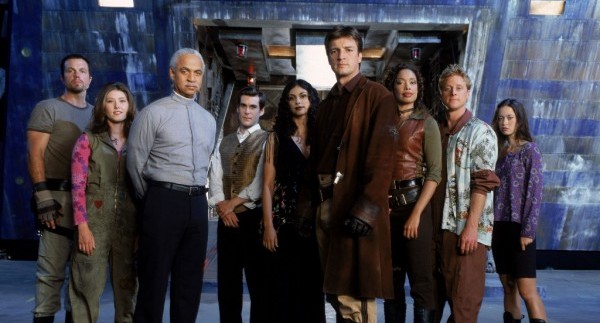
“Firefly is about nine people looking into the blackness of space and seeing nine different things.”
That’s apparently how Joss Whedon—creator of Buffy, Angel, and Dollhouse—pitched the show to Fox back at the beginning of the decade. Now, as we approach the end of the decade, I’ve finally watched it on DVD. And while I didn’t love it as arduously as others, I do understand the appeal.
That pitch above is apt, because the main characters—the crew and passengers of the Firefly-class spaceship Serenity—and specifically the differences between them are make the show. Granted, the concept is cool: the show is a hybrid of two genres, sci-fi and western. Aside from the aesthetic appeal of the mash-up, it also united our past and a (possible) future to comment upon our present.
The show is set in the future, after the two remaining superpowers on “the Earth that was” tried to unite all of mankind under one government called the Alliance. Captain Malcolm “Mal” Reynolds (Nathan Fillon) was a war hero of the failed resistance and now commands Serenity. Zoe Washburne (Gina Torres) served alongside him in the war, and the two share a camaraderie that not even Zoe’s husband Hoban Washburne (Alan Tudyk), pilot of the ship, can compete with. Also on the crew are mechanic Kaylee Frye (Jewel Staite) and the duplicitous Jayne Cobb (Adam Baldwin). Inara Serra (Morena Baccarin) rents one of the ship’s shuttles for her business as a “Companion”—i.e. a classy prostitute. And the ship’s passengers include Shepherd Derrial Book (Ron Glass), quite literally a man of the book; Simon Tam (Sean Maher), a young doctor; and River Tam, Simon’s tortured younger sister. The gang runs smuggling operations on the Serenity—often philanthropic, usually greedy—and try to stay one step ahead of the Alliance.
The show lasted for 11 episodes on Fox before getting the boot, and to say it got a raw deal from the beginning would be an understatement. Not only was the pilot episode, with all of its character introductions and backstories and other useful information, not shown until near the end of the run, but the rest of the episodes were switched around so much that it’s a wonder anyone followed the storyline. Nevertheless, the fan reaction was so avid that feature film Serenity and two comic-book series were released to fill the void. And all 14 episodes are available on DVD and Blu-ray.
I haven’t seen Serenity yet, so I don’t know the complete story, but I can comment on what aired on television. I’m interested to read that fans disputed its branding as an action-comedy instead of a character study. I am more of the mind that it straddled the line. Yes, it had weighty, emotional moments and interesting internal conflicts; but I remember it more for the rollicking adventures and clever schemes and general badass-ness. I haven’t seen a lot of Whedon’s work, so maybe I missed his emphasis on the human condition. But with Dollhouse, the character-driven storylines came into play later in the first season, so maybe the same would have happened with Firefly. Maybe it was just gearing up to really plumb the depths of these characters’ psyches.
I think Whedon was successful in his mission to show nine very different people and their different outlooks on life. I have nothing but love for The West Wing, but I had to admit that my screenwriting professor is right in her assessment of that show: everyone is playing the same character. This isn’t the case with Firefly. They’re not one big, happy family. They work together and fight the same fight, but they all have their issues, with each other and with themselves. And this is exacerbated by the fact that they can’t escape from each other, lest they jettison themselves out into space. I have to say, too, that I think the cast owned their roles. The casting is spot-on. At the time this aired, they were all still flying under the radar but now they’re finding success on other shows. (In fact, we just saw Baccarin and Tudyk last week on V.)
And Whedon sure knows how to sustain a suspenseful, twisting story. From the work of his that I’ve seen, I think he has mastered the “WTF” moment. When you watch as much television as I do, it’s easy to spot a lot of twists coming. But with these episodes, I was pleasantly surprised that I was being surprised again and again!
The series was smart, inventive, well-acted, and a lot of fun. So why don’t I love, love, love it as so many others do? Good question. My only guess is what I’ve deemed Dark Knight Syndrome: it’s been so hyped up by friends of mine that it could never have lived up to my expectations. I was doomed to only like it from the start. Alas.
So I will not overhype it for you. Watch it. You may enjoy it. Heck, you may even love it. If not, at least you’ll at least know what good (and underrated) television looks like.
